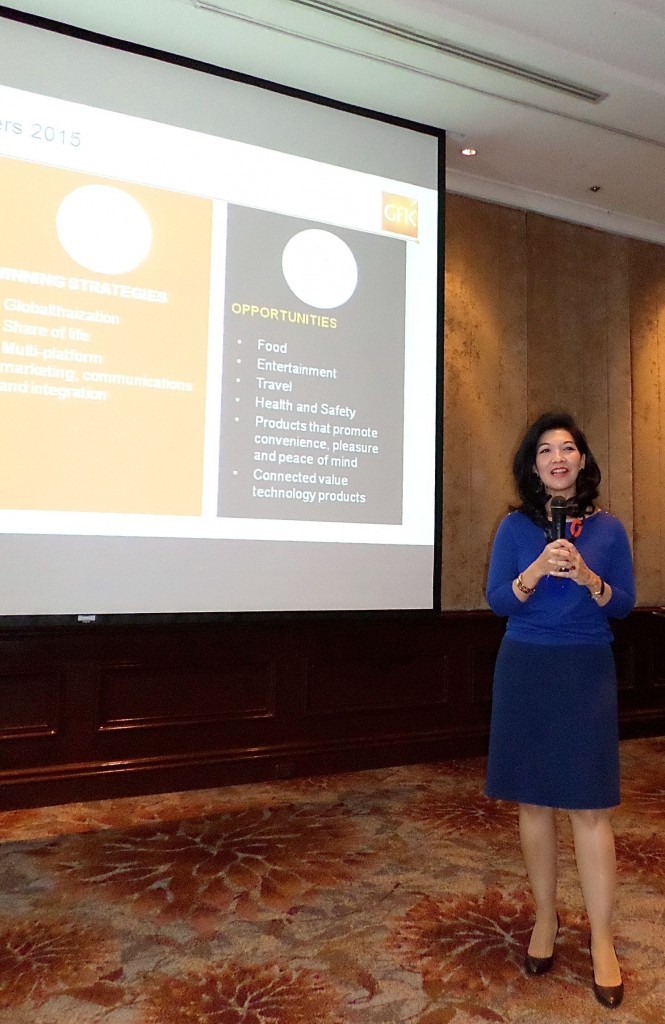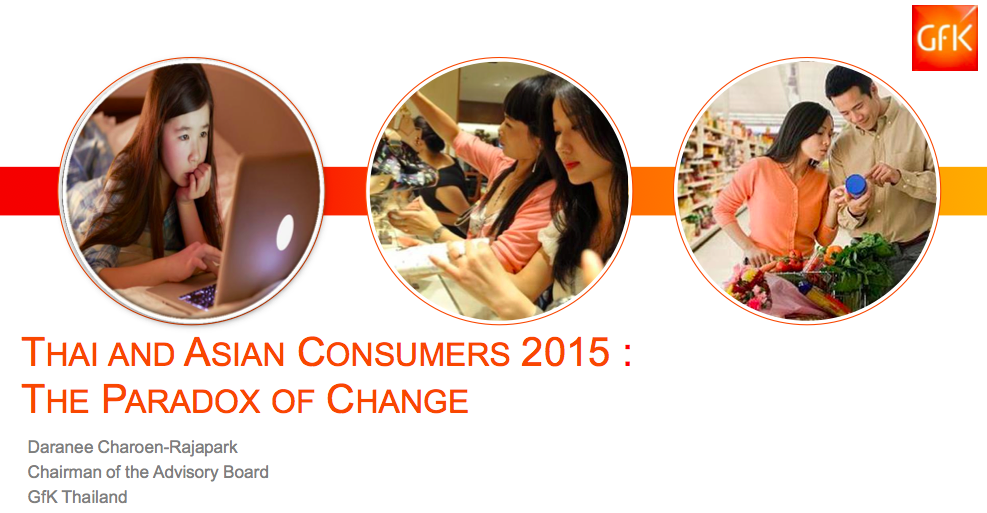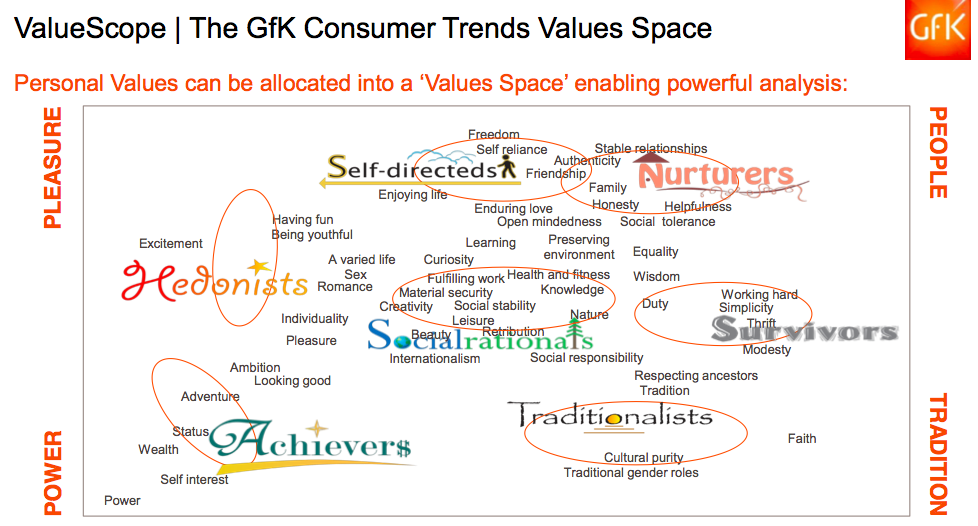
8 Jul, 2015
In high-tech, high-stress Asia, “Peace of Mind” products/services will be best-sellers – GfK research
Bangkok – As the people of Asia become more urbanised, more enamoured of technology and spend more time at work, the resulting high-stress societies will create big opportunities for products and services which promote convenience, pleasure and peace of mind.
That trend, already well under way, explains why travel & tourism, arguably the only economic sector that promotes convenience, pleasure and peace of mind under one umbrella, is experiencing such a regional and global boom. This includes all the various facets of travel & tourism ranging from entertainment and ecotourism to wellness and spiritual travel.
 Mrs. Daranee Charoen-Rajapark |
The trends were presented at a July 1 media briefing on the topic “Thai and Asian Consumer Trends 2015”, by Mrs Daranee Charoen-Rajapark, Chairman of the Advisory Board of GfK Thailand and Thailand Chairman of ESOMAR World Research Association. She compiled highlights of three recent GfK studies on consumer behavior in over 20 countries to identify three areas of behavioural change and recommend how companies should capture the emerging opportunities.
The study focussed on Thailand but also included findings from Australia, China, India, Indonesia and Japan.
Here are key points of the presentation:
Urbanization is rapidly changing the face of the consumer and by 2050, it is estimated that 75% of the world population will be living in urban areas. This results in an emerging middle class and an explosion in Asia in particular. According to the Organization of Economic Cooperation and Development (OECD), the number of middle class people will grow from 1.8 billion to 4.9 billion in 2030. Asia will account for a whopping 66% of this middle class.
Urbanisation is driving change in values. An extensive analysis helps identify seven globally relevant value types: Achievers, Traditionalists, Nurturers, Social Rationals, Survivors, Self-Directeds and Hedonists (see details of each below).
Achievers are the dominant type in Asia. They are defined as those who place high importance on attaining and exhibiting social status and may put their own interests ahead of others. At the other end are traditionalists who believe their inherited way of life is the best, are governed by religious beliefs/cultural traditions and follow prescribed rules and norms for most things.
In Asia Pacific, India and China have the highest percentage of Achievers at 67% and 40% respectively whereas Thailand registers up to 30%. While most Asian countries have the highest percentage of Achievers, Thailand rocks the trend with a very high 44% being Traditionalists.
Work now consumes a big part of the lives of the Asian middle class. Thailand registers the highest number of people working full time at an average of nearly 51 hours per week compared to the global average of 36.3 hours per week. India registers 50.6 hours, China and Indonesia, 45.3 hours each and the Japanese 37.3 hours.
This growing urban middle class faced with lifestyle changes and urbanization issues such as environmental pollution and quality, opens up good opportunities for food, entertainment, health and safety related products, and products that promote convenience, pleasure and peace of mind. With less time to spare and higher concern for safety, buying well-known brands that are trusted becomes even more important for a high 75% of the Thai consumers.
 |
Although Thais may have a high traditional mindset, the paradox is that Thailand is tipped as one of the top 10 growth markets for technology in 2015.
Based on a GfK Thailand nationwide survey of 989 consumers aged 11-70 years old in Thailand households in May-June 2015, 70% have their own smartphone, 23% a regular mobile phone, 18% a tablet, 17% a personal desktop computer, 13% a personal laptop computer and 12% an office desktop computer. A total of 77% access the internet through their smartphone, 53% at home, 33% at school/university/office and 24% from a wi-fi hotspot.
Since 2010, smartphone usage in Thailand has grown by an astronomical at 816% with total market value of USD 3.1 billion whereas the growth of personal computer was only 20% with total market value of USD 694 million
Thai middle class consumers value high connectivity. Key activities on the internet are now social networking at 58%, watching clips/uploaded programs at 43%, email at 38%, watching TV and chatting at 22% each, and reading newspapers/magazines online at 21%. A high 15% search for travel information and 11% buy products online.
Watching TV on the internet is especially high at 28% with young audiences 11-19 years old. 61% of the consumers still say watching television is the most attractive, memorable and trusted media, and about half still believe that television is the media of the future.
Mrs Daranee recommends that in Thailand, companies’ strategies must now include “globalthaization” which gains from the strengths of globalization but takes into account the deep-rooted beliefs, traditions and culture of the Thai people; capturing “share of life” rather than share of wallet by playing a meaningful role and improving consumers’ quality of life; and adopting a multi-platform marketing, communications and integration mobile strategy.
GfK forecasts that businesses that venture into connected value (convergence of technology, connected devices and need for mobility) such as wearables, health and fitness devices, and the smart home are key growth areas.
ValueScope Introducing the Seven ValueTypes
Based on extensive values analysis GfK Research has identified seven globally relevant Value Types:
- Achievers are people who place a high importance on attaining and exhibiting social status. In this pursuit they may put their own interests ahead of others. They focus on money as a way to show they have succeeded, as well as a way to buy things that also express achievement.
- Survivors to always give their best effort while being modest and self-effacing . They are not looking for a lot of money, just enough to pay the bills. They are careful with the money they have. They want to keep their life as simple and uncluttered as possible. They are happy with their culture and do not want it to be complicated by outside influences.
- Social rationals want to save the world, not because they are idealists but because they feel it is sensible to do so. They view the world as a large and diverse place where differences should be respected in order to maintain order. They value being open-minded and tolerant and affording equal opportunity to all.
- Traditionalists believe that their inherited way of life is the best and does not need to change. They want their life to be governed by their religious beliefs and cultural traditions. In such a world, people follow prescribed rules and norms for most things, including how men and women should behave.
- Hedonists need instant gratification. They are constantly searching for new stimulating experiences. They seek adventure and risk to feel that they are alive. They need to feel young, each day being a new adventure. Most of all they want to have a good time and indulge their desires, preferably with close friends.
- Self-Directeds are all about being true to themselves. They value freedom of action and thought so they can choose their own goals and achieve them. They are curious about the world and what it has to offer, and think it is important to respect ethnic, religious and racial differences.
- Nurturers put a high importance on maintaining long-term commitment to friends and family, and the home is the focal point for them. It is important to them to have close supportive friends as well as making an effort themselves to help others. In building these relationships, they find it important to be sincere and to have integrity.

Methodology and background
- GfK Consumer Life : 1,000 nationwide consumers in each country including Thailand with face to face methodology, 2014
- GfK Thailand Retail Audit : Panel research with key retailers in Thailand, March 2015
- GfK TV and Technology Study : 989 nationwide consumers in Thailand with quantitative face to face methodology and online methodology, May-June 2015
About GfK
GfK Thailand is part of GfK which is one of the world’s largest research companies with over 13,000 experts in over 100 offices around the world. GfK Thailand clients include leading multinational organizations, large Thai companies and non-profit organizations. GfK Thailand is a member of the Thailand Marketing Research Society and ESOMAR World Research and strictly adheres to all international code of conduct and ethics for market researchers.



Liked this article? Share it!